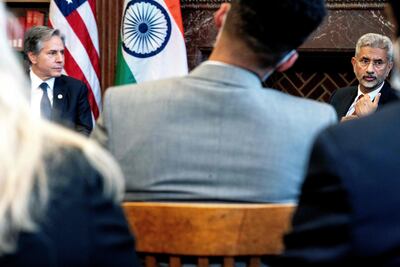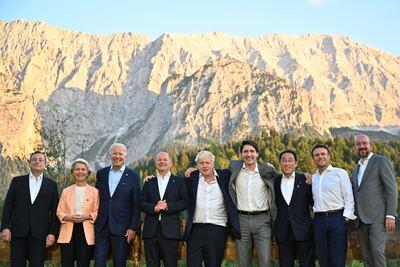2023 looks set to be a year when India takes an increasingly important role in international relations. Not only is its population expected to surpass that of China in the next few months – and is predicted to be 50 per cent bigger than its neighbour’s by the 2060s – but the country holds the presidency of the G20, and going by the first few days of January, Indian Prime Minister Narendra Modi intends to take an activist approach to the role.
Last week, for instance, he addressed 120 countries and told them that the Global South should do nothing less than create a new world order. “We, the Global South, have the largest stakes in the future. Three fourths of humanity lives in our countries,” he said at the opening of the Voice of Global South Summit 2023 in New Delhi. “We should also have equivalent voice. Hence, as the eight-decade-old model of global governance slowly changes, we should try to shape the emerging order.”
“Most of the global challenges have not been created by the Global South. But they affect us more,” he continued. “We have seen this in the impacts of Covid pandemic, climate change, terrorism and even the Ukraine conflict. The search for solutions also does not factor in our role or our voice.”
It is hard to disagree with Mr Modi. The P5, or permanent members of the UN Security Council, remain the US, Russia, China and, increasingly unjustifiably, the UK and France. There is no official rule which says that the head of the World Bank must always be an American and the managing director of the IMF a European, yet that cosy sharing out of the top jobs appears set in stone.
The current world order “is still very, very deeply western”, as Indian Foreign Minister Subramanyam Jaishankar has put it, adding that “Europe has to grow out of the mindset that Europe's problems are the world's problems, but the world's problems are not Europe's problems".

The two men should find a receptive audience. I wrote in these pages last August that a de facto new Non-Aligned Movement is steadily taking shape – not as an organisation as such, but in the way that the likes of Indonesian President Joko Widodo and Singaporean Foreign Minister Vivian Balakrishnan are making clear that they do not wish to take sides, whether for or against the US, Russia, China or anyone else. Chatham House’s departing director, Robin Niblett, said that what he called the “neo-non-aligned” made up “the largest group of countries in the world today”.
“Perhaps it is they,” he said, “who are setting the pace today.” That is closer to Mr Modi’s call. For important though the old Non-Aligned Movement was in the heyday of its founding giants – India's Jawaharlal Nehru, Ghana's Kwame Nkrumah, Indonesia's Sukarno, Egypt's Gamal Abdel Nasser and Yugoslavia's Josip Broz Tito – it was known more for its efforts to stay clear of the Cold War than for shaping global geopolitics.
This is what the former US State Department official Anne-Marie Slaughter was getting at in an interview last year when she stressed the huge significance of the Global South’s response to the war in Ukraine. “This is not the Non-Aligned Movement of the 20th century. This is a bunch of important powers – India, Brazil, South Africa, the Association of South-East Asian countries – who are saying, ‘This is no longer our war, and what we’re really worried about is our own regional conflicts.’”
Ms Slaughter, president of the New America think tank, was pointing out that Global South countries are already acting in ways that are more impactful than the old Non-Aligned Movement was, even if this is a fact that western countries have not taken on board properly, since most still labour under the illusion that “the world” is united in a fight against autocracy.

But what Mr Modi urges the Global South to do is far more ambitious. Some might say audacious. Is he really expecting a group of experts, possibly centred around his newly announced Global South Centre for Excellence, to come up with alternatives to the UN, or for the Asian Infrastructure Investment Bank to displace the IMF and the World Bank? (Probably not, since the AIIB is a Chinese project.)
Not as yet. He is proposing a “Global South Young Diplomats Forum to connect youthful officers to our foreign ministries”, which could potentially be very effective in shaping a shared consciousness in the coming decades. For now he is calling for “fundamental reform” of organisations including the UN Security Council, the World Bank and the IMF.
Perhaps Mr Modi should ask for something more, as people have been demanding reforms to these organisations for years, to little avail. In a new essay, Foreign Policy magazine’s Ravi Agrawal writes: “The non-western world – the long-ignored Global South – or the ‘Rest’, as it’s often called – is making its voice heard. These parts of the planet, younger and faster-growing than the West but also more vulnerable to climate change, are becoming increasingly powerful and more assertive stakeholders in global politics. Policymakers and businesses in the West will need to adapt.”
So far they have proved slow to do so, when they are not in outright denial about changing realities. If fundamental, drastic reform does not take place soon, then Mr Modi’s idea of the Global South shaping a new global order will not seem fanciful at all. Especially not if by 2050, according to one projection, the world’s top five economies are China, India, Indonesia and Brazil, plus the US. Standing up for the world order of the 20th century will be by then indefensible. Changing to fit the “Rest” is in the West’s best interests – if it is not to be left behind when the “Rest” rule the world.


